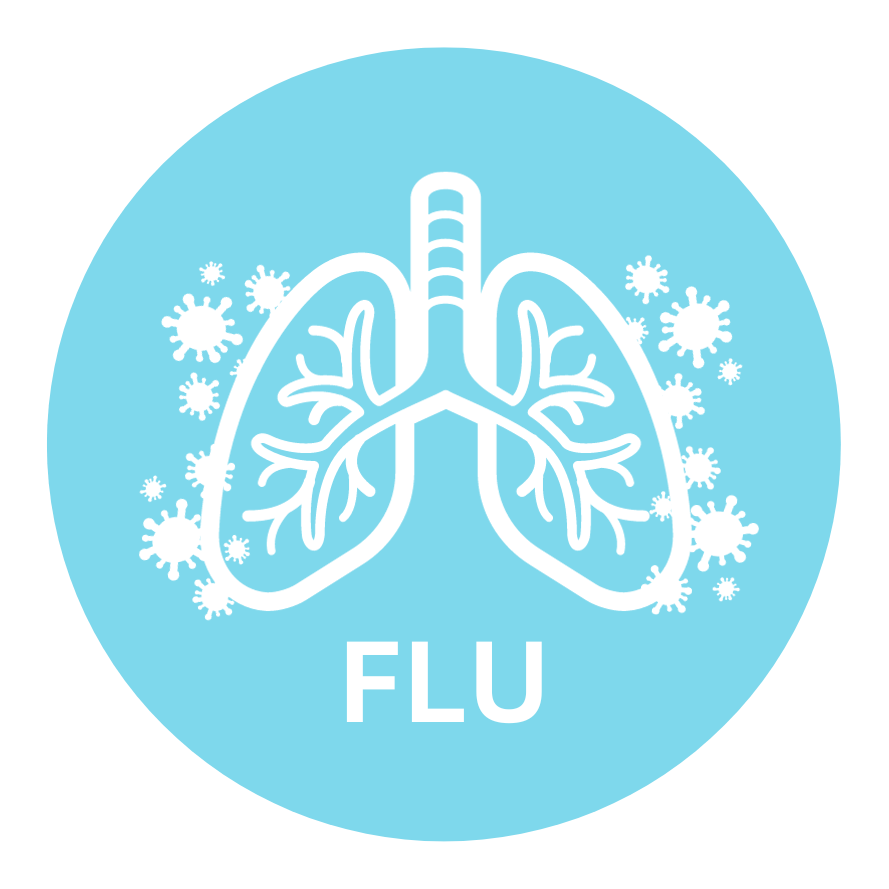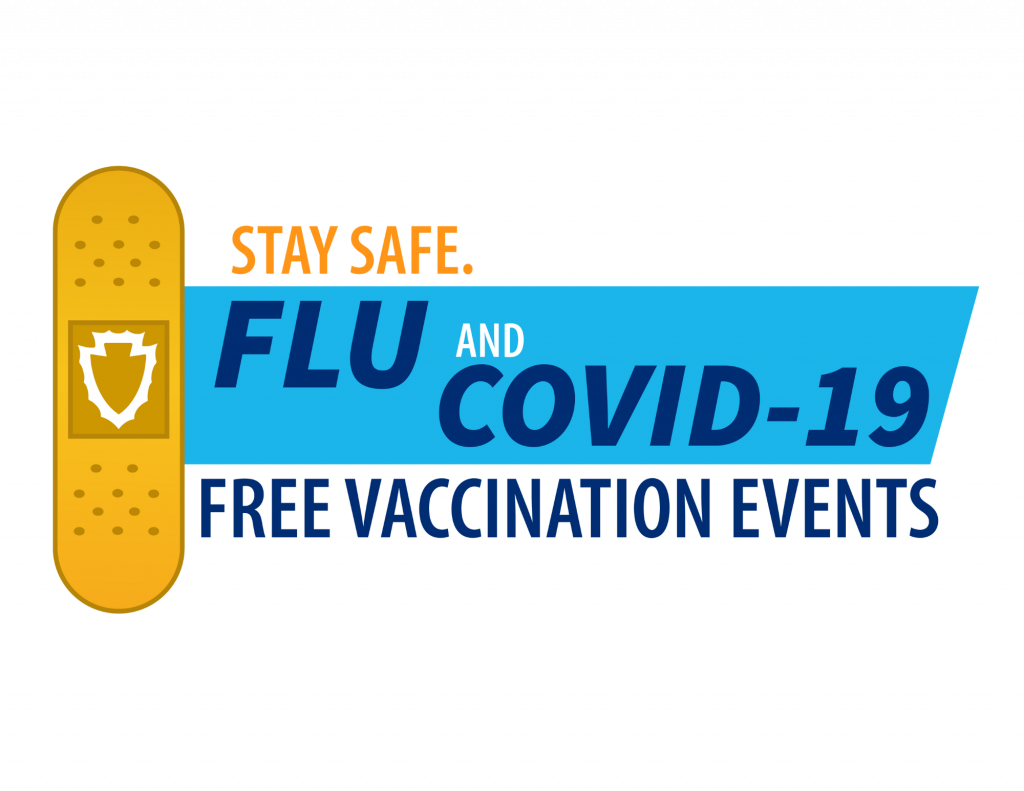Influenza (Flu)
Flu is a contagious respiratory illness caused by influenza viruses that infect the nose, throat, and sometimes the lungs. Flu can cause mild to severe illness that is easily spread from person to person. The best way to protect yourself and your family against flu is by getting vaccinated. Getting vaccinated against the flu prevents millions of illnesses, reduces the need for doctor visits and hospitalizations, and saves lives every year.

Influenza (flu) Virus Symptoms
The Influenza (flu) virus can cause mild to severe illness, and at times can lead to death. Flu symptoms usually come on suddenly. People who have flu often feel some or all of these symptoms:
- fever* or feeling feverish/chills
- cough
- sore throat
- runny or stuffy nose
- muscle or body aches
- headaches
- fatigue (tiredness)
- some people may have vomiting and diarrhea, though this is more common in children than adults.

Flu Prevention
- Stay up to date on vaccines: The flu vaccines is best way to prevent seasonal flu and the best protection against severe illness.
- Stay home when you are sick: Stay home and away from others if you have any symptoms.
- Avoid close contact, especially with people who are sick: When you are sick, keep your distance from others to protect them from getting sick too.
- Wash your hands: Wash your hands often, with soap and warm water, for at least 20 seconds. If soap and water are not available, use a hand sanitizer with at least 60% alcohol.
- Cover your mouth and nose: Cough or sneeze into your elbow, arm, or disposable tissue. Make sure to wash your hands or sanitize and dispose of your tissue afterward.
- Avoid touching your eyes, nose or mouth: Germs are often spread when a person touches something that is contaminated with germs and then touches his or her eyes, nose, or mouth.
- Practice other good health habits: Clean and disinfect frequently touched surfaces at home, work or school, especially when someone is ill. Get plenty of sleep, be physically active, manage your stress, drink plenty of fluids, and eat nutritious food.
- Avoid sharing utensils: Don’t share food or eating utensils (forks, spoons, cups) with others.
- Treatments: If you have symptoms of flu and are at increased risk for complications, are very sick or worried about your illness, contact your health care provider. Influenza antiviral drugs may be a treatment option. Antiviral drugs work best when started early, such as one to two days after your flu symptoms begin.
Learn more about Health Habits to Help Prevent the Flu.

About Flu
Influenza, commonly known as the flu is a contagious respiratory illness caused by influenza viruses that infect the nose, throat, and sometimes the lungs. Influenza is a contagious viral infection. Viral infections are any illness you get from a virus (a small germ that uses your cells to reproduce). Flu can cause mild to severe illness. Serious outcomes of flu infection can result in hospitalization or death. Some people, such as older people, young children, and people with certain health conditions, are at high risk of serious flu complications.
The best way to prevent the flu is by getting the flu shot each year.
The best way to prevent the flu is to get the flu vaccine every year. Vaccines train your immune system to recognize infections and fight them off before you get sick. The influenza virus can change (mutate) a little bit every year, which is why the Centers for Disease Control and Prevention (CDC) recommends a yearly flu shot (vaccine) for everyone 6 months of age and older.

GET YOUR FREE FLU SHOT TODAY!
For a limited time, free updated Flu and COVID-19 vaccines are available to those who live and work in San Bernardino County! Getting vaccinated against the flu and COVID-19 is a safe and powerful tool to help prevent severe illness, doctor visits, hospitalizations, and even death.
Register for both updated vaccines at MyTurn.ca.gov.
Respiratory viruses, like influenza (flu), COVID-19, and respiratory syncytial virus (RSV), circulate year-round in the U.S. and California—and are typically more active in fall and winter. This period of time is referred to as “cold and flu season” or “virus season.”
CDPH encourages people to take simple actions to lower their chances of getting and spreading respiratory viruses. These precautions are especially important for people at higher risk of severe illness.
- Stay Up to Date on Vaccines. Vaccines are the best defense against severe illness and death—and you can get all at the same time. Visit MyTurn to schedule your vaccines or contact your healthcare provider.
- Flu and COVID-19 vaccines are available for everyone 6 months and older and have been updated to protect against new variants.
- RSV immunizations are now available for infants and young children, pregnant people and adults 60 years and older. Learn more about RSV immunizations.
- Stay Home if You’re Sick: Staying home when you’re sick slows the spread of flu, COVID-19, RSV and even the common cold.
- Test and Treat: Test for COVID-19 and flu if you have symptoms. If you test positive, contact your health care provider and ask about prescription treatments. Act fast, most of these medications must be taken within the first 5 days of symptoms. Learn more about COVID-19 treatments.
- Consider Wearing a Mask: Wearing a mask can slow the spread of respiratory viruses. If you or your family member are at high risk for severe illness, consider wearing a mask, especially in public indoor or crowded spaces. For more information, visit When and Why to Wear a Mask.
- Wash Your Hands: Frequent handwashing, with soap and warm water—for at least 20 seconds—is an easy and effective way to stay healthy and slow the spread of germs. If soap and water are not available, use a hand sanitizer with at least 60% alcohol.
- Cover Your Cough or Sneeze: Cough or sneeze into your elbow, arm, or a disposable tissue. Make sure to throw away your tissue then wash or sanitize your hands.
Learn more about respiratory virus prevention.
The flu, common cold, and COVID-19 are all contagious respiratory illnesses, but they are caused by different viruses. Because some of the symptoms of the flu, cold, and COVID-19 are similar, it may be hard to tell the difference between them based on symptoms alone, and testing may be needed to help confirm a diagnosis. To learn the difference between the three illnesses, visit the links below:
Similarities and Differences between Flu and the Common Cold
Similarities and Differences between Flu and COVID-19
Learn about those who are at higher risk for flu complications.
Immunization Registry Notice to Patients and Parents (Aviso del registro de inmunizaciones para pacientes y padres)
Notice of Privacy Practices (Notificación de Prácticas de Privacidad)
Vaccine Information Statement (VIS) (Declaración de Información Sobre la Vacuna)
VAERS and VERP: Report Vaccine Adverse Events & Administration Errors
Why should people get vaccinated against the flu?
Influenza is a potentially serious disease that can lead to hospitalization and sometimes even death. Every flu season is different, and influenza infection can affect people differently, but millions of people get flu every year, hundreds of thousands of people are hospitalized and thousands to tens of thousands of people die from flu-related causes every year. An annual seasonal flu vaccine is the best way to help protect against flu. Vaccination has been shown to have many benefits including reducing the risk of flu illnesses, hospitalizations, and even the risk of flu-related death in children.
How do flu vaccines work?
Flu vaccines cause antibodies to develop in the body about two weeks after vaccination. These antibodies provide protection against infection with the viruses that are used to make the vaccine. The seasonal flu vaccine protects against the influenza viruses that research indicates will be most common during the upcoming season.
What kinds of flu vaccines are available?
CDC recommends the use of any licensed, age-appropriate influenza vaccine during the 2020-2021 influenza season, including inactivated influenza vaccine [IIV], recombinant influenza vaccine [RIV], or live attenuated influenza vaccine (LAIV). No preference is expressed for any influenza vaccine over another. Both trivalent (three-ingredient) and quadrivalent (four-ingredient) influenza vaccines will be available. There are many flu vaccine options to choose from, but the most important thing is for all people 6 months and older to get a flu vaccine every year. If you have questions about which vaccine is best for you, talk to your doctor or other health care professional. More information on approved flu vaccines for the 2020-2021 flu season, and age indications for each vaccine are available in CDC’s Table: U.S. Influenza Vaccine Products for the 2020-2021 Season.
Are any of the available flu vaccines recommended over others?
For the 2020-2021 flu season, the Advisory Committee on Immunization Practices (ACIP) recommends annual influenza (flu) vaccination for everyone 6 months and older with any licensed, influenza vaccine that is appropriate for the recipient’s age and health status, including inactivated influenza vaccine (IIV), recombinant influenza vaccine (RIV), or live attenuated nasal spray influenza vaccine (LAIV4) with no preference expressed for any one vaccine over another. There are many vaccine options to choose from, but the most important thing is for all people 6 months and older to get a flu vaccine every year. If you have questions about which vaccine is best for you, talk to your doctor or other healthcare professional.
Who Should Not Be Vaccinated?
Different influenza (flu) vaccines are approved for use in different age groups. In addition, some vaccines are not recommended for certain groups of people. Factors that can determine a person’s suitability for vaccination or vaccination with a particular vaccine, include a person’s age, health (current and past) and any allergies to flu vaccine or its components. For more information, visit Who Should and Who Should NOT get a Flu Vaccine.
When should I get vaccinated?
You should get a flu vaccine before flu viruses begin spreading in your community since it takes about two weeks after vaccination for antibodies to develop in the body and provide protection against the flu. Make plans to get vaccinated early in the fall, before flu season begins. Vaccinations should continue to be offered throughout the flu season, even into January or later.
Learn more Key Facts About Seasonal Flu Vaccine.
Is it safe to get a flu vaccine and a COVID-19 vaccine at the same time?
Yes, flu vaccines and COVID-19 vaccines can be given at the same visit if you are due for both vaccines. Getting vaccinated against flu and COVID-19 prevents millions of illnesses, doctor visits, hospitalizations, and deaths every year. Go to MyTurn.ca.gov or contact your healthcare provider to schedule your updated vaccines for both flu and COVID-19.
Is there a Health Order for health care workers to be vaccinated?
Starting June 1, 2024, the Health Officer Order regarding the influenza vaccination for healthcare workers will be rescinded. However, it is strongly recommended that health care workers continue adherence to Health and Safety Code section 1288.7. More information can be found here.
Local Partners
San Bernardino County is a proud partner of the FightFluTogether Coalition
The FightFluTogether Coalition is made up of hospitals and health care systems, providers, public health professionals, health departments and community organizations which includes the Centers for Disease Control and Prevention, California Department of Public Health, and California Hospital Association. The goal of the coalition is to educate the community on the importance of the flu vaccine and encourage individuals to get the flu shot by providing resources on how and where to get the vaccine.

